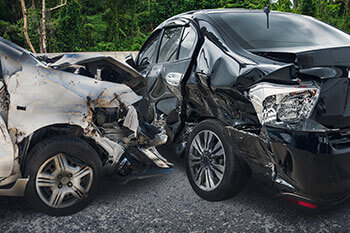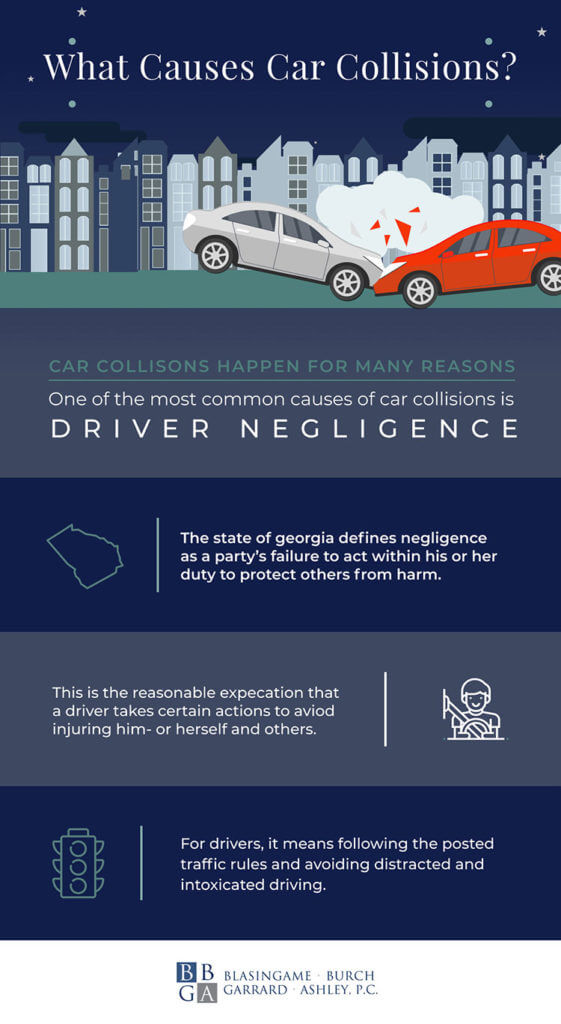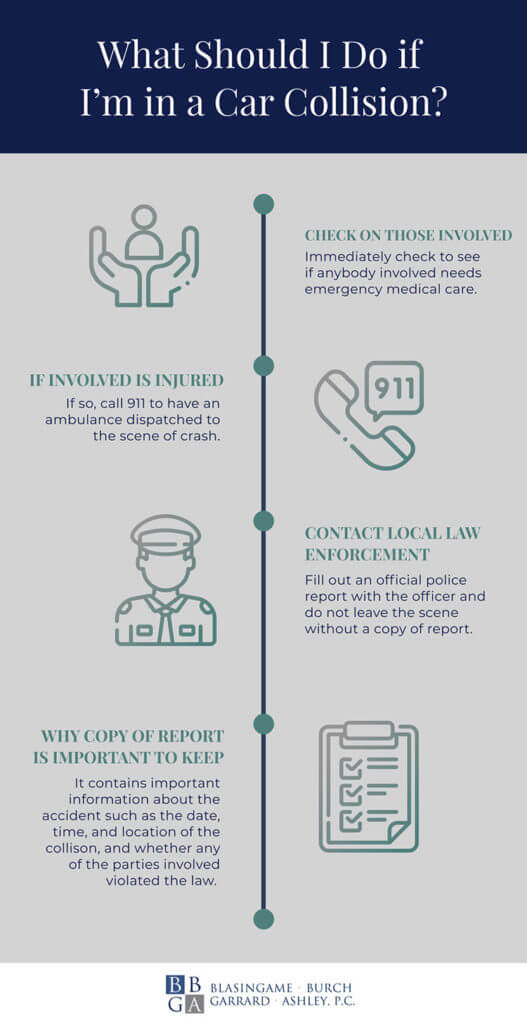Athens, Georgia Car Accident Attorney
Hurt in a car accident? Don’t hesitate to reach out. Call Blasingame, Burch, Garrard & Ashley, P.C. today for a free case evaluation: 706-354-4000
We have offices in Athens and Lake Oconee, and we handle cases throughout the state of Georgia.

No matter how careful a driver is, accidents happen.
Unfortunately, there is no way to eliminate the chance of being involved in a car crash, but you can protect yourself after an accident by consulting with an experienced car accident lawyer in Athens, Georgia.
When a car accident occurs, the individuals involved can suffer injuries, and in some cases, death.
In 2016, there were 1,554 recorded traffic fatalities in Georgia. Of these accidents, 368 involved an impaired driver.
If you’re the victim of a car accident in Athens, Georgia, you may suffer steep financial damages.
Medical bills, emotional trauma, missed opportunities to advance in your career, an abrupt end to your career, or conditions like paralysis, amputations, or cognitive disability that require recurring medical treatments can change your life forever.
These can all be expensive burdens. To lessen the financial stress of suffering from a car accident injury, you can file a personal injury claim after a collision to seek monetary compensation.
For a free consultation, please call (706) 354-4000 or send us an online message today.
If you have catastrophic injuries from a car crash or your loved one was killed in a crash, call us and speak to an Athens car crash attorney. If it’s after hours or on a weekend or holiday, hit the prompt to speak to one of our skilled personal injury lawyers. If you searched for an ‘Athens car accident attorney near me,’ you’ve come to the right place. We are ready to help you.
Georgia Car Accident FAQ
There are a wide number of injuries that come with being involved in a car accident. Some include broken bones, brain injuries, severe cuts, life-altering injuries, burns, and spinal cord injuries.
If you suffered an injury you should immediately seek medical attention, your health should be your number one concern. Then, contact the authorities so they can file an accident report. Finally, contact a car crash attorney, most personal injury attorneys offer free consultations and work off a contingency fee basis. Learn more here.
You can demonstrate an accident happened by providing a copy of the official police report. Click here to learn more about how fault is determined in a vehicle accident in Georgia.
Jump to a Topic About Georgia Car Accidents
What Causes Car Accidents?
Car accidents happen for many reasons. One of the most common causes of car accidents is driver negligence.
The state of Georgia defines Negligence as a party’s failure to act within his or her duty to protect others from harm.
This is the reasonable expectation that a driver takes certain actions to avoid injuring him- or herself and others. For drivers, it means following the posted traffic rules and avoiding distracted and intoxicated driving.
Examples of driver negligence include:
- Driving drunk
- Driving while under the influence of prescription medication
- Text messaging while driving
- Speeding
- Failing to follow right-of-way rules
- Failing to stop, yield, and merge as instructed
- Driving while too exhausted to drive safely
Driver negligence is not the only issue that causes car accidents. Sometimes, car accidents occur because one or more of the vehicles involved malfunction in some way. When this happens, the vehicle’s owner, the vehicle or faulty part’s manufacturer, or the vehicle’s seller can be deemed the negligent party, depending on the nature of the malfunction.
Related: Did you Crash Because of a Tire Defect?
Car accidents can also occur because roadways may have a poor design or poor maintenance. When this is the case, the party tasked with maintaining the area where the accident occurred, which could be the municipal, county, state, federal government, or a private party, may be held liable for the victim’s damages.

Serving Athens, Atlanta, and Greater Georgia
Common Types of Car Accident Injuries
The injuries you suffer in a Georgia car accident depend on a variety of factors. The speed at which it happened, the angle at which it happened, your overall fitness level, and your car’s safety features can all play a role in the final outcome.
Types of injuries include:
- Broken bones,
- Soft tissue injuries,
- Traumatic brain injury,
- Burns,
- Cuts,
- Rotator cuff injuries,
- Spinal cord injuries,
- And more.
If you have suffered injuries from a car accident fill out the form below with the details of what happened:
What Should I Do if I’m in a Car Accident?
Immediately check to see if anybody involved needs emergency medical care. If so, call 911 to have an ambulance dispatched to the scene.
Next, contact local law enforcement. Fill out an official police report with the officer and do not leave the scene without a copy of this report. It contains important information about the accident such as the date, time, and location of the collision, and whether any of the parties involved violated the law.
Take as many photos of the scene as you safely can to fully illustrate what happened and how you were injured. Exchange insurance information with all other parties involved. Do not leave the scene without this information, pictures, and contact information for any witnesses to the accident.
After leaving the scene, seek medical attention for yourself as soon as you can. Click here for more information.

LEARN MORE ABOUT HOW OUR GEORGIA CAR ACCIDENT ATTORNEYS CAN HELP YOU. CALL THE FIRM TODAY AT (706) 354-4000
How Do Negligence and Liability Work in Georgia Car Accident Claims?
As we mentioned above, negligence is the act of carelessly or recklessly endangering others. When an individual causes another party to suffer an injury through his or her negligence, he or she is liable for that party’s damages. This means the negligent party – or his or her insurance provider – must compensate the victim for his or her damages.
In Georgia, injured motorists must seek compensation from the negligent parties’ insurance providers. This is how it works in most, but not all, states. In a few states, drivers instead recover compensation from their own insurance providers through personal injury protection (PIP) claims.
More than one party can be negligent in a car accident. As long as you do not hold more than 49 percent of the responsibility for the accident, you can recover compensation for your damages. This is known as Georgia’s modified comparative negligence law.
Keep in mind that if you are partially at fault for your accident, the total compensation amount you can recover is reduced according to the percentage of the fault you hold. For example, if you are seeking $100,000 in compensation and you are 20 percent at fault, you can only recover up to $80,000 in compensation.
How Can I Prove I’m a Victim of Negligence?
Your Georgia auto accident claim must sufficiently demonstrate the following:
- The insured party had a duty to act in a manner to avoid injury to others
- He or she breached that duty somehow
- Because of the breach, an accident occurred
- In the accident, you suffered a specific injury that caused you to suffer specific financial damages
Breaking this down, you will see there are a few distinct points you have to prove to successfully recover compensation. With a skilled auto accident attorney in Georgia at your side, they may be able to prove these points with specific pieces of evidence.
You can demonstrate that an accident occurred by providing a copy of the official Georgia police report.
Demonstrating that the other party acted negligently can be a bit more complicated.
The evidence used to prove this point includes:
- Photographs of the accident scene that show the point of impact and the damage to both vehicles
- Testimonies from witnesses to the accident
- A digital reconstruction of the accident that shows how the collision occurred
Proving Injuries From Your Collision
Next, you must prove that you suffered specific injuries because of the accident. The evidence you provide must show, without a doubt, that your injuries exist only because of the accident, and that they did not occur before the accident or independently of it.
Evidence that can show this includes:
- Testimony from your doctor discussing the injury
- Copies of your medical record showing when specific injuries were recorded
- Photographs of your injury at the time of the accident
The final piece, demonstrating the specific financial damages you suffered because of your injury, often requires the most evidence. Some of this evidence overlaps with other categories’ evidence.
It can include:
- Testimony from your doctor discussing the treatment you received and will continue to need to manage chronic conditions related to the injury;
- Copies of your medical bills;
- Documentation showing the time you spent out of work to recover and the monetary value of your lost days’ wages. You will need to provide pay stubs to prove this latter point;
- Documentation that shows the long-term career damages you suffered due to the injury. This can include copies of your Social Security Disability Insurance claim, documentation showing your projected career path, and testimony from your doctor discussing your long-term and permanent physical limitations because of the injury;
- Itemized receipts of all miscellaneous expenses you faced related to the injury, like the cost of bandages and over-the-counter medication;
- Testimony from a mental health care provider discussing your emotional and psychological trauma related to the accident and how it affects your quality of life; and
- Testimonies from loved ones, journal entries, and any other documentation that shows how you are suffering from a reduced ability to enjoy the activities you once enjoyed because of the injury.
Will I Have to Go to Court?
If you file a personal injury lawsuit to recover compensation for your damages, you could have to go to court. Often, victims are advised to take this action when it becomes clear they will not be able to reach a settlement with the negligent parties’ insurance providers, and the two-year statute of limitations on their claim is drawing near.
Even if you do file a lawsuit, you might not have to go to court. Many lawsuits resolve outside of court through mediation or arbitration.
A Georgia personal injury attorney can advise you about the right actions to take to continue pursuing compensation for your damages. If your Georgia auto accident lawyer feels your original insurance claim was handled in bad faith, he or she may suggest you file a bad faith claim to seek compensation for the damages you suffered due to the insurance company’s mishandling of your claim.
What Should I Avoid with My GA Auto Accident Claim?
There are a lot of ways a claimant can inadvertently invalidate his or her claim or significantly reduce the amount of compensation he or she is entitled to recover.
As a general rule, there are two people whose advice you should always follow when you are recovering from an injury and pursuing a personal injury claim:
- Your lawyer
- Your doctor
Failure to heed your doctor’s advice can prolong your physical recovery and potentially make it more difficult for you to recover compensation.
As the plaintiff, you have the duty to mitigate your damages – in other words – correct the problems you are facing to the best of your ability. This is one of the reasons why it is so important that you seek appropriate medical attention for your injury as soon as possible after your accident in Athens, Georgia.
Why Could My Car Accident Case be Dismissed?
You can also hurt your claim by saying the wrong thing or agreeing to a lowball auto accident settlement.
After you file your claim, the other party’s insurance provider will contact you and offer you a settlement amount. Do not accept it without first discussing it with your Georgia accident lawyer, do not agree to make any statements about the case, and do not say anything about the accident that is not an objective, neutral fact.
For example, you can confirm that you were involved in a car accident at a specific intersection on a specific date. But if you are asked specific details about your own speed or what you remember seeing in the moments before the accident, declined to make a statement.
It is also important that you avoid exaggerating your injury in discussions with anybody, whether that is your Georgia auto accident lawyer, your doctor, the insurance provider, or the court. If you are caught lying, your claim could be dismissed. Lying about an injury to recover compensation is insurance fraud.
You should avoid waiting to take action. As soon as you can after the accident, get a medical diagnosis and start treatment for your injury. Then, start working with a skilled personal injury lawyer. Be proactive at every stage of your claim’s progress because this will increase your chance of recovering the compensation you deserve.
Work with a Trusted Athens Car Accident Lawyer Today
When you are suffering from a car accident injury you have the right to pursue monetary compensation for your damages through a personal injury claim. The most effective way to pursue these damages is to work with an experienced personal injury attorney who can be your advocate.
Contact our team online or call Blasingame, Burch, Garrard & Ashley, P.C. at (706) 354-4000 today to set up your free legal consultation.
We are here to answer all your specific questions and work with you to pursue the compensation you deserve. There is no fee unless we resolve your case.
Common Topics About Car Accidents
- Georgia Statute of Limitations | Personal Injury Cases (3/15/2025)
- BBGA Has Paid Out Millions of Dollars in Referral Fees Over the Last 10 Years (2/24/2025)
- How Are Medical Bills Paid After a Car Accident in Georgia? (2/9/2025)
- 8 Most Common Types of Motorcycle Accident Injuries (1/14/2025)
- 7 Signs You Should Go to the Hospital After a Car Accident (1/14/2025)
- Pain and Suffering Examples in Personal Injury Cases (1/13/2025)
- 10 Common Types of Car Accident Injuries (1/12/2025)
- What’s the Average Settlement for a Semi-Truck Accident in Georgia? (12/22/2024)
- Holiday Travel Tips: Staying Safe on Georgia’s Roads This Season (12/5/2024)
- Guide to Filing a Diminished Value Claim in Georgia (10/16/2024)
Disclaimer: The information on this website is for general information purposes only. Nothing on this site should be taken as legal advice for any individual case or situation. This information is not intended to create, and receipt or viewing does not constitute, an attorney-client relationship.
